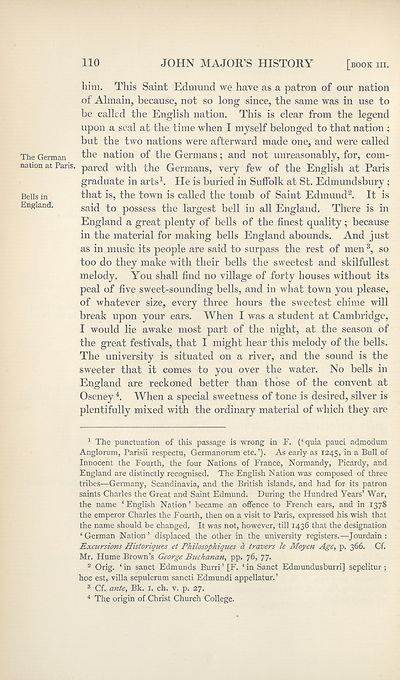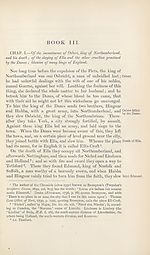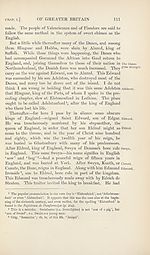Series 1 > History of Greater Britain, as well England as Scotland
(255) Page 110
Download files
Complete book:
Individual page:
Thumbnail gallery: Grid view | List view

110 JOHN MAJOR’S HISTORY [book hi.
him. This Saint Edmund we have as a patron of our nation
of Almain, because, not so long since, the same was in use to
be called the English nation. This is clear from the legend
upon a seal at the time when I myself belonged to that nation ;
but the two nations were afterward made one, and were called
The German the nation of the Germans; and not unreasonably, for, com-
nation at Pans, pared with the Germans, very few of the English at Paris
graduate in arts1. He is buried in Suffolk at St. Edmundsbury ;
Bells in that is, the town is called the tomb of Saint Edmund2. It is
England. said to possess the largest bell in all England. There is in
England a great plenty of bells of the finest quality; because
in the material for making bells England abounds. And just
as in music its people are said to surpass the rest of men 3, so
too do they make with their bells the sweetest and skilfullest
melody. You shall find no village of forty houses without its
peal of five sweet-sounding bells, and in what town you please,
of whatever size, every three hours the sweetest chime will
break upon your ears. When I was a student at Cambridge,
I would lie awake most part of the night, at the season of
the great festivals, that I might hear this melody of the bells.
The university is situated on a river, and the sound is the
sweeter that it comes to you over the water. No bells in
England are reckoned better than those of the convent at
Oseney i. When a special sweetness of tone is desired, silver is
plentifully mixed with the ordinary material of which they are
1 The punctuation of this passage is wrong in F. (‘quia pauci admodum
Anglorum, Parisii respectu, Germanorum etc. ’). As early as 1245, in a Bull of
Innocent the Fourth, the four Nations of France, Normandy, Picardy, and
England are distinctly recognised. The English Nation was composed of three
tribes—Germany, Scandinavia, and the British islands, and had for its patron
saints Charles the Great and Saint Edmund. During the Hundred Years’ War,
the name ‘ English Nation ’ became an offence to French ears, and in 1378
the emperor Charles the Fourth, then on a visit to Paris, expressed his wish that
the name should be changed. It was not, however, till 1436 that the designation
‘ German Nation ’ displaced the other in the university registers.—Jourdain :
Excursions Historiquzs et Philosophiques ct travers le Moyen Age, p, 366. Cf.
Mr. Hume Brown’s George Buchanan, pp. 76, 77.
2 Grig. 1 in sanct Edmunds Burri ’ [F. ‘ in Sanct Edmundusburri] sepelitur ;
hoc est, villa sepulcrum sancti Edmundi appellatur.’
3 Cf. ante, Bk. 1. ch. v. p. 27.
4 The origin of Christ Church College.
him. This Saint Edmund we have as a patron of our nation
of Almain, because, not so long since, the same was in use to
be called the English nation. This is clear from the legend
upon a seal at the time when I myself belonged to that nation ;
but the two nations were afterward made one, and were called
The German the nation of the Germans; and not unreasonably, for, com-
nation at Pans, pared with the Germans, very few of the English at Paris
graduate in arts1. He is buried in Suffolk at St. Edmundsbury ;
Bells in that is, the town is called the tomb of Saint Edmund2. It is
England. said to possess the largest bell in all England. There is in
England a great plenty of bells of the finest quality; because
in the material for making bells England abounds. And just
as in music its people are said to surpass the rest of men 3, so
too do they make with their bells the sweetest and skilfullest
melody. You shall find no village of forty houses without its
peal of five sweet-sounding bells, and in what town you please,
of whatever size, every three hours the sweetest chime will
break upon your ears. When I was a student at Cambridge,
I would lie awake most part of the night, at the season of
the great festivals, that I might hear this melody of the bells.
The university is situated on a river, and the sound is the
sweeter that it comes to you over the water. No bells in
England are reckoned better than those of the convent at
Oseney i. When a special sweetness of tone is desired, silver is
plentifully mixed with the ordinary material of which they are
1 The punctuation of this passage is wrong in F. (‘quia pauci admodum
Anglorum, Parisii respectu, Germanorum etc. ’). As early as 1245, in a Bull of
Innocent the Fourth, the four Nations of France, Normandy, Picardy, and
England are distinctly recognised. The English Nation was composed of three
tribes—Germany, Scandinavia, and the British islands, and had for its patron
saints Charles the Great and Saint Edmund. During the Hundred Years’ War,
the name ‘ English Nation ’ became an offence to French ears, and in 1378
the emperor Charles the Fourth, then on a visit to Paris, expressed his wish that
the name should be changed. It was not, however, till 1436 that the designation
‘ German Nation ’ displaced the other in the university registers.—Jourdain :
Excursions Historiquzs et Philosophiques ct travers le Moyen Age, p, 366. Cf.
Mr. Hume Brown’s George Buchanan, pp. 76, 77.
2 Grig. 1 in sanct Edmunds Burri ’ [F. ‘ in Sanct Edmundusburri] sepelitur ;
hoc est, villa sepulcrum sancti Edmundi appellatur.’
3 Cf. ante, Bk. 1. ch. v. p. 27.
4 The origin of Christ Church College.
Set display mode to:
![]() Universal Viewer |
Universal Viewer | ![]() Mirador |
Large image | Transcription
Mirador |
Large image | Transcription
Images and transcriptions on this page, including medium image downloads, may be used under the Creative Commons Attribution 4.0 International Licence unless otherwise stated. ![]()
| Scottish History Society volumes > Series 1 > History of Greater Britain, as well England as Scotland > (255) Page 110 |
|---|
| Permanent URL | https://digital.nls.uk/127734825 |
|---|
| Attribution and copyright: |
|
|---|
| Description | Over 180 volumes, published by the Scottish History Society, containing original sources on Scotland's history and people. With a wide range of subjects, the books collectively cover all periods from the 12th to 20th centuries, and reflect changing trends in Scottish history. Sources are accompanied by scholarly interpretation, references and bibliographies. Volumes are usually published annually, and more digitised volumes will be added as they become available. |
|---|


